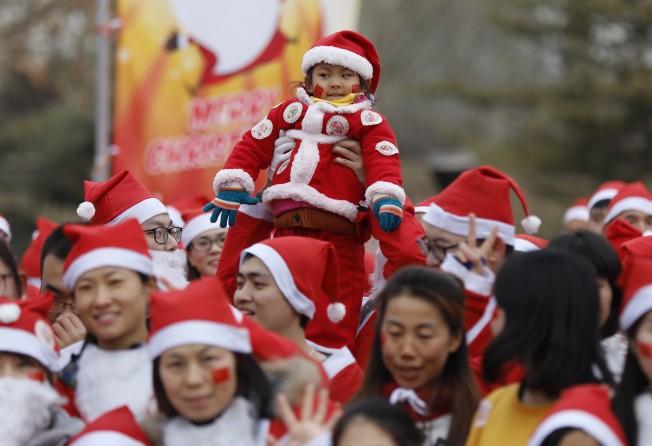Enjoying Christmas doesn’t make you any less Chinese
- Local governments in at least four cities and one county in mainland China ordered restrictions on Christmas celebrations
- But believing in the beauty of Christmas does not diminish any passion we have for Chinese history and traditional values

My 2018 has been bumpy: lost jobs, broken relationships, failed investments, and finally a terrible injury from horse riding, with three broken bones and now three pieces of titanium in my spine.
Physically on the mend but spiritually down in the gutter, when Christmas was finally approaching, I felt desperately in need of a long conversation with Santa to make sure he would send me some gifts of peace and joy.
Yet Beijing is not exactly the best place to have such a hopeful conversation, especially not this year. A few nights before Christmas Eve, while driving through the city’s central business area and seeing fewer festive lights, I felt as if someone had stolen my Christmas. Naive as it might sound, this has become the reality in some cities.
In at least four cities and one county here in China, local governments have ordered restrictions on Christmas celebrations, according to official notices and interviews. For instance, Langfang city, south of Beijing, banned Christmas stage performances and shopping promotions. Shop windows were also stripped of decorations and streets kept free of Christmas lights, said the Associated Press. Local police in Kunming issued a notice to public places such as bars, cafes and hotels, saying: “It is forbidden to hang Christmas stockings, wear Christmas hats, place Christmas trees, and so on.” Clearly it was not wise or safe for Santa Claus to visit those cities with Rudolph and all the gifts.
Being a Christian, I have never expected to celebrate Christmas in China the same way as in other places where religion is more prevailing or at least, allowed. Mainstream Chinese culture and values are very much rooted in Confucianism as well as in thousands of years of history that departs from that of the West. We also now have an atheist government which holds on to a set of principles different to the original values of Christianity.
Against all odds though, Christmas has become a popular holiday in China, especially for the millennial generation who grew up with the internet and imported pop culture mainly from the US and Europe. Christmas is more celebrated here commercially than as a religious day. Urban dwellers in China recognise Christmas as a happy occasion associated with glittering lights along city streets, lighthearted carols in office buildings and big discounts in shops. Few, except the Christian communities, would bother to learn or think about its religious origins.
But the beauty of Christmas transcends our differences. As human beings, we all want joy, hope and peace. We all long for love and reassurance. Our hearts all need to be touched, be it with a hug, music or a nice gift. I still have the Bible in Chinese that my grandmother gave me as a gift when I was 10. It is a memory of someone I deeply love and miss all the time. I grew up with her gentle voice telling stories from the Bible, and small gatherings of people in her house on Sundays and Christmas. It was after she passed away that I started going to church regularly. Every time I pray, I feel like she is still with me. That is what Christmas really means to me personally. No one could ever take that away.
Some in China see celebrating Christmas as a sign of being ‘eroded’ by Western culture and forgetting our own Chinese values and traditions. I disagree. For my family and I, the most important celebration has always been the Lunar New Year, which marks the real beginning of a new chapter ahead.
Believing in the beauty of Christmas does not diminish any passion we have for Chinese history and traditional values. Instead, an open heart filled with joy and peace, as the Christmas spirit often teaches us, helps one greatly to be more tolerant, more understanding and more resilient in facing life’s obstacles and challenges. I believe these are some core values shared with Chinese traditional culture. History has proved it is better to have variety in what people can and should believe in. Diversity with tolerance stands stronger in times of division and disagreement.
Haining Liu is a journalist and aspiring author